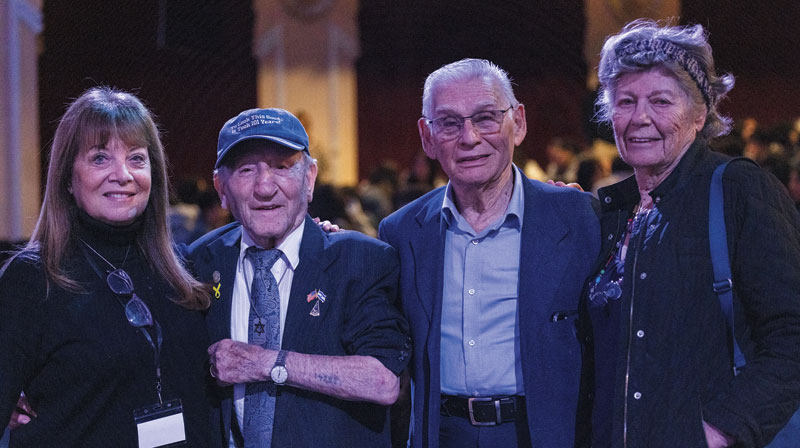With strident calls for action and threats of “taking to the streets” if the issue is not soon resolved, participants in the 10th anniversary conference of the Jewish Orthodox Feminist Alliance (JOFA) ratcheted up the rhetoric around the plight of agunot, “chained women” whose husbands refuse to grant them a religious bill of divorce.
“Let this be the last JOFA conference where we need to ask if there’s a halachic heter [permissive legal ruling] for agunot,” Tova Hartman, founder of an Orthodox feminist synagogue in Jerusalem, told the approximately 1,000 people, mostly women, who attended a conference earlier this month in New York City. “The time has come to stop kvetching.”
The rhetoric on agunot contrasted sharply from that on other topics at the conference, where a sense of confidence bordering on the triumphant prevailed, owing to the substantial progress made in the decade since JOFA’s founding.
Women today serve as congregational heads, spiritual leaders and advisers on matters of religious law. They have greater access to rigorous textual study that once was the domain of men. And their participation in public prayer is on the rise with the growth of so-called “partnership minyanim,” in which women take on some leadership roles — including reading the Torah and leading certain prayers — in an otherwise typical Orthodox service.
Other issues, like marking a girl’s bat mitzvah, have fallen off the agenda entirely now that such celebrations are par for the course in Orthodox congregations.
“It is a slow and gradual progress,” JOFA Executive Director Robin Bodner said. “There is definitely progress. There is definitely change.”
Hartman electrified the conference with her talk of civil disobedience and the creation of alternative religious courts to address the plight of agunot, who under Jewish law are forbidden to remarry until their husbands have “released” them from marriage with a get, or religious bill of divorce.
In the worst cases, husbands have refused to grant religious divorces to their wives for years, sometimes issuing the documents only in exchange for sizable ransoms.
In the United States, various rabbinic courts and civil laws provide some recourse. In New York, state law requires spouses to remove all religious barriers to remarriage before a civil divorce is granted; a similar law is under consideration in Maryland.
In Israel, marriage remains under the purview of rabbinic courts that have the power to enforce their rulings. The problem, agunot advocates say, is that those powers are rarely used by judges, all of them male and drawn mostly from the ranks of the ultra-Orthodox.
An international rabbinic conference on the topic, the first of its kind, was scheduled for last November by Israel’s Sephardi chief rabbi, Shlomo Amar. It was canceled at the last minute, however, reportedly due to pressure from Rabbi Yosef Shalom Elyashiv, an Ashkenazi rabbi widely considered the most authoritative figure in the fervently Orthodox world.
“It’s time that we in the Modern Orthodox world challenge the power of a handful of extremist Charedi rabbis,” Sharon Finkel Shenhav, the only woman serving on Israel’s commission to appoint religious judges, said at the conference.
Shenhav said the ultra-Orthodox, also known as haredim, control the courts only because “we let them.”
One possible halachic solution, the so-called “tripartite” solution, would have couples sign a prenuptial agreement stipulating that the marriage is dissolved if a husband and wife voluntarily live apart for a certain amount of time.
Rabbi Shlomo Riskin, the American-born chief rabbi of Efrat, Israel, argued for that option in an address to a standing-room only crowd at the convention.
While some accused the rabbinic courts of outright corruption, Riskin said the principal obstacle to resolving the issue is the courts’ preoccupation with “what they think is the purity of Israel as over and against the plight of the agunah.”
The tripartite solution is nearly airtight from a halachic standpoint, Riskin said, but it would only affect future marriages and would have little impact on existing agunot. Even so, he’s under no illusions that the idea will be enacted.
“If it does not work, then I believe we will have no choice but to establish alternative batei din,” or rabbinic courts, he said.
JOFA plans to take ads in Jewish media demanding action on agunot from the Orthodox rabbinate. The ads, which call the situation an “injustice” and a “disgrace,” would be timed to coincide with the Fast of Esther, which falls this year on March 1.
“If the community rose up, ultimately that’s how things are changed,” Bodner said. “We need to keep pushing for this change. We’re going to do it. Somehow, some way.”






















 More news and opinions than at a Shabbat dinner, right in your inbox.
More news and opinions than at a Shabbat dinner, right in your inbox.